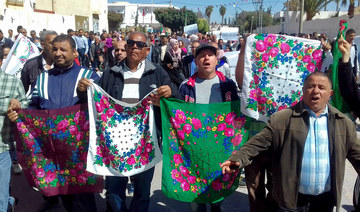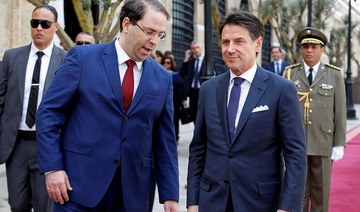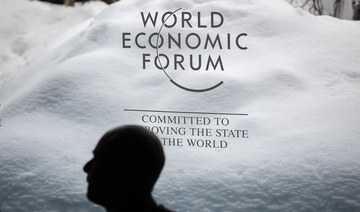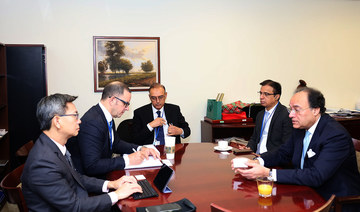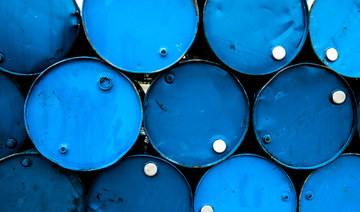TUNIS: Tunisia raised the minimum wage for industrial and farm workers as well as pensions for hundreds of thousands of private-sector retirees by 6.5 percent on Wednesday in a move to defuse discontent over economic hardships.
Thousands protested on Monday in the central city of Sidi Bouzid against marginalization and deteriorating economic conditions. Hundreds of disgruntled young people also rallied in the northern city of Kef on Tuesday, demanding jobs.
A government statement said Prime Minister Youssef Chahed had approved a rise in the monthly minimum wage for industrial and agricultural workerss of 6.5 percent to 403 dinars ($133.93).
A 6.5 percent rise in pensions for 700,000 retirees in the private sector was also approved.
Hundreds of retirees demonstrated in front of parliament this week demanding higher pensions to counter rising inflation and and declining purchasing powers.
Chabad’s decision came in the face of pressure from Tunisia’s foreign creditors for a freeze in wages in the public sector, which includes some industrial workers, to reduce its large budget deficit.
The North African country has been hailed as the Arab Spring’s only democratic success story because protests toppled autocrat Zine El Abidine Ben Ali in 2011 without triggering violent upheaval, as happened in Libya, Egypt and Syria.
But since then, nine cabinets have failed to resolve Tunisia’s economic woes including high inflation and unemployment, and impatience over its slowness in carrying out reforms is rising among lenders such as the IMF.
The IMF has pushed Tunisia to freeze public-sector wages — the bill for which doubled to about 16 billion dinars ($5.5 billion) in 2018 from 7.6 billion in 2010 — to reduce them from about 15.5 percent of GDP now to 12.5 percent in 2020.
They also want Tunis to trim spending to help reduce its heavy budget deficit, though such steps risk adding fuel to public anger over joblessness and poverty.
Tunisia raises minimum wages, pensions to tackle discontent
Tunisia raises minimum wages, pensions to tackle discontent
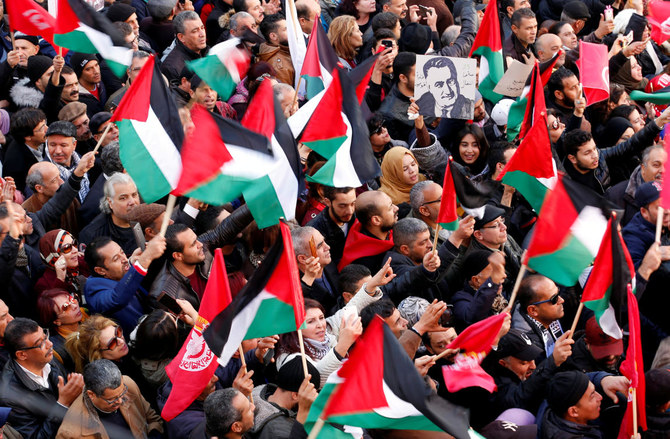
- Thousands protested on Monday in the central city of Sidi Bouzid against marginalization and deteriorating economic conditions
- Tunisia has been hailed as the Arab Spring’s only democratic success story because protests toppled autocrat Zine El Abidine Ben Ali in 2011 without triggering violent upheaval
Minister affirms Riyadh as global solutions hub ahead of special meeting of World Economic Forum
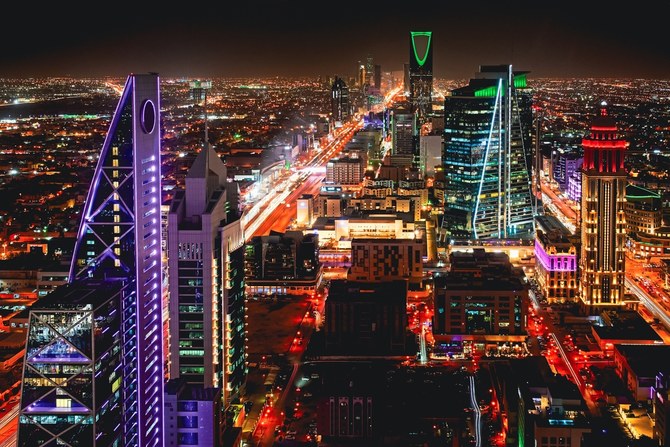
RIYADH: Riyadh has emerged as a beacon of “thought leadership, action, and solutions,” stated one of Saudi Arabia’s top officials as the Kingdom’s capital prepares to host the World Economic Forum.
Faisal Al-Ibrahim, the minister of economy and planning, made the comments ahead of the summit on global collaboration, growth, and energy for development, slated for April 28 to 29, which aims to empower leaders from both public and private sectors to tackle mutual global challenges.
According to the WEF website, the meeting will also advance key forum initiatives in the region and beyond as it aims to bridge the growing North-South global divide, which has further widened on issues such as emerging economic policies, the energy transition and geopolitical shocks.
“The Crown Prince’s patronage of the World Economic Forum Special Meeting in Riyadh is a testament to our leadership’s determination to convene the world to take action and expand global collaboration on the critical topics of our time,” said Al-Ibrahim in a post on X.
He welcomed global leaders to this pivotal moment for social, economic, and human development, urging them to “build bridges toward a secure, stable and sustainable future.”
Saudi Arabia’s Diriyah Co. unveils its mixed-use commercial office and retail offering Zallal
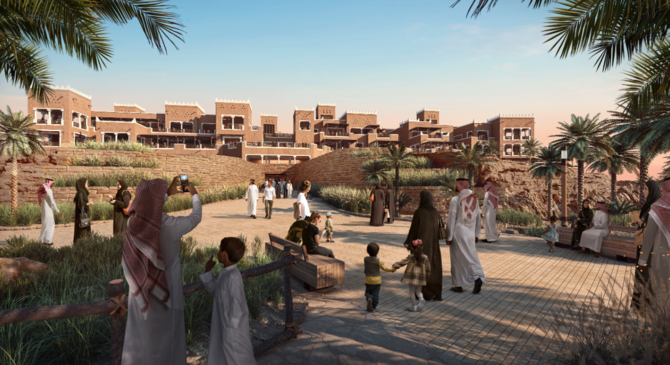
RIYADH: Saudi Arabia’s Diriyah Co. has shared plans for its inaugural mixed-use commercial office and retail development Zallal, set to launch in the Bujairi district during the first half of 2025.
This project will feature two low-rise office buildings with a combined leasable space of around 6,000 sq. m. Additionally, there will be 12 mixed retail and food and beverage outlets spread across about 8,000 sq. m.
Located next to the popular Bujairi Terrace, Zallal will benefit from proximity to a venue that attracts thousands of visitors daily.
The development is also located close to the recently completed Diriyah Art Futures and the soon-to-open Bab Samhan Hotel.
Jerry Inzerillo, group CEO of Diriyah Co, said: “We have been delighted with the hugely positive reception that Zallal has had from the commercial sector, and we are in advanced negotiations with international and local companies eager to benefit from the central location in the heart of Diriyah and the diverse range of accessible retail, F&B and office space available.”
He added: “With construction well underway, Zallal maintains the exciting momentum at Diriyah, and when open, will benefit from the thousands of daily visitors to Bujairi Terrace becoming the latest completed precinct in our rapidly developing masterplan.”
Mitsui to join with ADNOC and others in LNG project in UAE, Nikkei reports

TOKYO: Japan’s Mitsui & Co plans to participate in a $7 billion liquefied natural gas project in the UAE, teaming up with Abu Dhabi National Oil Co. and others, the Nikkei reported on Tuesday.
ADNOC will participate with a stake of around 60 percent and Mitsui with 10 percent of the project, the Nikkei said, adding Mitsui’s investment is estimated to be several tens of billions of yen.
Other oil majors Shell, BP and Total Energies are also expected to invest, the report said.
The companies aim to produce about 10 million metric tons of LNG per year, the report said.
Pakistan eyes new IMF loan by early July, finance minister says
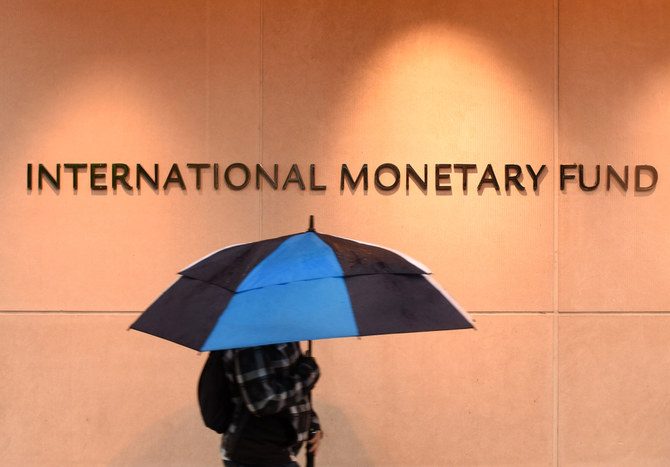
ISLAMABAD: Pakistan could secure a staff-level agreement on a new long-term larger loan with the International Monetary Fund by early July, its finance minister said on Tuesday, according to Reuters.
The country’s current $3 billion arrangement with the fund — which it secured last summer to avert a sovereign default — runs out in late April.
The $350 billion South Asian economy faces a chronic balance of payment crisis. The government is seeking a larger, long-term loan to help stabilize economic activity and financial markets so it can execute long-due, painful structural reforms.
If secured, it would be the 24th IMF bailout for Pakistan.
“We are still hoping that we get a staff-level agreement by June or early July,” Finance Minister Muhammad Aurangzeb told a conference in Islamabad.
He returned from Washington last week after leading a team to attend the IMF and World Bank’s spring meetings.
“We had very good discussions in Washington,” he said.
He said he did not know at this stage the volume and tenure of the longer program, although he has previously said that he was looking for at least a three-year bailout plan.
Both sides have said they were already in discussions for the new loan. A formal request, however, will be made once the current facility expires, with the IMF board likely to meet late this month to approve the second and last tranche of the current support scheme.
The economy is expected to grow by 2.6 percent in the fiscal year 2024, the finance minister said, adding that the inflation was projected at 24 percent, down from 29.2 percent in fiscal 2023. It touched a record high of 38 percent last May.
Aurangzeb said structural reforms would include increasing the government’s tax revenue-to-GDP ratio to 13 percent to 14 percent in next two or three years from the current level of around 9 percent, reducing losses of state-owned enterprises through their privatization, and better management of the debt-laden energy sector.
Oil Updates – prices stabilize, Middle East tensions remain in focus

NEW DELHI: Oil prices edged higher on Tuesday, after falling in the previous session, as investors continued to assess the risk from geopolitical concerns in the Middle East, according to Reuters.
Global benchmark Brent crude oil futures traded 18 cents higher at $87.18 a barrel by 9:34 a.m. Saudi time, and US West Texas Intermediate crude futures also gained 16 cents to $82.06 a barrel.
Both benchmarks fell 29 cents in the previous session on signs that a recent escalation of tensions between Israel and Iran had little near-term impact on oil supplies from the region.
“The unwinding of geo-political risk premium has dented crude oil prices recently as supply was not disrupted meaningfully,” said Sugandha Sachdeva, founder of Delhi-based research firm SS WealthStreet.
But the evolving geopolitical landscape remains critical in steering crude oil prices, she said.
“While there are no indications of an imminent full-scale war between the countries involved, any escalation in tensions could quickly reverse the current trend,” Sachdeva added.
ANZ analysts echoed the sentiment and highlighted US approval of new sanctions on Iran’s oil sector that broaden current sanctions to include foreign ports, vessels and refineries that knowingly process or ship Iranian crude.
Also, EU foreign ministers agreed in principle on Monday to expand sanctions on Iran after Tehran’s missile and drone attack on Israel, the bloc’s foreign policy chief Josep Borrell said.
“The geopolitical backdrop is still very fraught with so many risks at the moment, so clearly we’re going to see a lot of volatility until there’s a lot more clarity around it,” the ANZ analysts said in a podcast.
Israeli troops fought their way back into an eastern section of Khan Younis in a surprise raid, residents said on Monday, sending people who had returned to abandoned homes in the ruins of the southern Gaza Strip’s main city fleeing once more.
Investors are waiting for the release of the US gross domestic product figures and the March personal consumption expenditure data — the Fed’s preferred inflation gauge — later this week to assess the trajectory of monetary policy.
US crude oil inventories are expected to have increased last week while refined product stockpiles likely fell, according to a preliminary Reuters poll of analysts.
“Sticky US inflation figures, hawkish statements from key Fed officials, and rising US inventories are all acting as constraints on crude oil price growth,” Sachdeva said.



